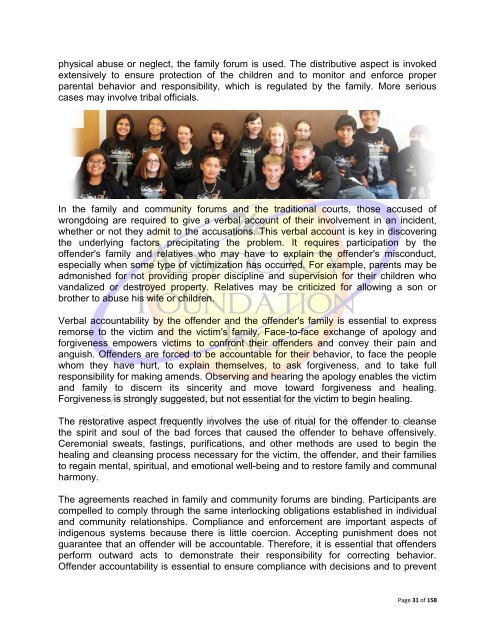Native American Youth In The Juvenile Justice System
Native American Youth In The Juvenile Justice System
Native American Youth In The Juvenile Justice System
Create successful ePaper yourself
Turn your PDF publications into a flip-book with our unique Google optimized e-Paper software.
physical abuse or neglect, the family forum is used. <strong>The</strong> distributive aspect is invoked<br />
extensively to ensure protection of the children and to monitor and enforce proper<br />
parental behavior and responsibility, which is regulated by the family. More serious<br />
cases may involve tribal officials.<br />
<strong>In</strong> the family and community forums and the traditional courts, those accused of<br />
wrongdoing are required to give a verbal account of their involvement in an incident,<br />
whether or not they admit to the accusations. This verbal account is key in discovering<br />
the underlying factors precipitating the problem. It requires participation by the<br />
offender's family and relatives who may have to explain the offender's misconduct,<br />
especially when some type of victimization has occurred. For example, parents may be<br />
admonished for not providing proper discipline and supervision for their children who<br />
vandalized or destroyed property. Relatives may be criticized for allowing a son or<br />
brother to abuse his wife or children.<br />
Verbal accountability by the offender and the offender's family is essential to express<br />
remorse to the victim and the victim's family. Face-to-face exchange of apology and<br />
forgiveness empowers victims to confront their offenders and convey their pain and<br />
anguish. Offenders are forced to be accountable for their behavior, to face the people<br />
whom they have hurt, to explain themselves, to ask forgiveness, and to take full<br />
responsibility for making amends. Observing and hearing the apology enables the victim<br />
and family to discern its sincerity and move toward forgiveness and healing.<br />
Forgiveness is strongly suggested, but not essential for the victim to begin healing.<br />
<strong>The</strong> restorative aspect frequently involves the use of ritual for the offender to cleanse<br />
the spirit and soul of the bad forces that caused the offender to behave offensively.<br />
Ceremonial sweats, fastings, purifications, and other methods are used to begin the<br />
healing and cleansing process necessary for the victim, the offender, and their families<br />
to regain mental, spiritual, and emotional well-being and to restore family and communal<br />
harmony.<br />
<strong>The</strong> agreements reached in family and community forums are binding. Participants are<br />
compelled to comply through the same interlocking obligations established in individual<br />
and community relationships. Compliance and enforcement are important aspects of<br />
indigenous systems because there is little coercion. Accepting punishment does not<br />
guarantee that an offender will be accountable. <strong>The</strong>refore, it is essential that offenders<br />
perform outward acts to demonstrate their responsibility for correcting behavior.<br />
Offender accountability is essential to ensure compliance with decisions and to prevent<br />
Page 31 of 158

















